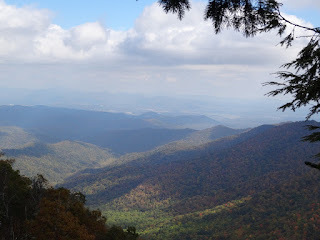 |
| Blue Ridge |
I’ve been thinking about setting because I’m working on two
stories in quite different environments. One is in Mexico and the other the
Blue Ridge Mountains. The mountain setting is near me and I can easily go
there. Mexico, especially the jungle in Chiapas, is much more difficult. I
spent some time in Toluca and loved it, but I never got to Chiapas. It’s
requiring a lot of research.
Setting, or place, has several functions in a story. The
simplest is that it provides background for your characters if you use
something well known or that has a character of its own. “He’s from the Bronx.”
“She’s from Savannah.” These statements give an initial impression of the
character based on our ideas of these places. You may go on to add detail or
provide more specific information, but the reader still has certain
expectations. We don’t expect the character from the Bronx to be slow-talking
and laid back, and we’d be surprised to find the Savannah character edgy and
in-your-face; if this were the case, you’d have to explain why.
 |
| On the road to Tenango |
Setting also provides a backdrop and color for your story.
Streets, buildings, restaurants, or some wild, rugged terrain—it all depends on
your story and what you want to happen. Most people write what they know or
have a good chance of finding out. I wouldn’t set a book in Alaska because I
doubt if I could get enough of a feeling for it from books and movies or the
Internet, but I could set one in Atlanta or most towns in the South. Even
Texas, in the last few years, has taken on a more “cowboy” character and would
be harder to write about in depth.
These days, if you chose a place you’re not familiar with,
you can easily find pictures and information about restaurants, streets,
businesses, and places of interest on the Internet. But be sure you’re correct.
If you can find someone who’s spent time there, try to interview them or have
them review your story for accuracy. They may be able to add some details you
wouldn’t otherwise find, such as smells, sounds, whether it’s windy or the air
is visibly polluted.
 |
| Threatening storm over TeoTenango |
Setting also affects the characters’ attitudes and
expectations. If they live in a small town with a strong religious community,
it might influence their actions in certain situations, or it could provide
part of the conflict. Think what kind of setting would add to your story. What
could enrich it?
I have my work cut out for me, but I love both places, so it's fun.
4 comments:
In my books, setting is vital, especially in my Romantic Adventure books where setting becomes almost a character. I love researching the places, the culture, the environment, but I agree, get someone who has been there or lives there, to vet your work.
I know your two new books will be incredible because your prior books have been placed it their settings so well that I don't doubt anything in the story for a second. Furthermore, I want to go see these places and experience them for myself.That can't be said of many books I've recently read.
Hugs,
L.A. Sartor
Hey, Ellis. I have to have the setting before I can begin writing or even coming up with the characters. I'm a bit different that way, I think. Loved reading your post. I shared. :)
L.A., I love the settings in your books and have read more about them when I finished the books. You have a good sense of place.
Marsha, you were so nice to share. It is unusual to start with the setting, but sometimes it's what calls to you. I start with characters, then plot and setting. Research is too much fun, and I get sidetracked and want to include more.
Second Act is next on my TBR stack. I lived in Fort Worth for a short time during my childhood, but that was so long ago I don't remember anything except they served tortillas at school lunch instead of the biscuits I was used to.
Post a Comment